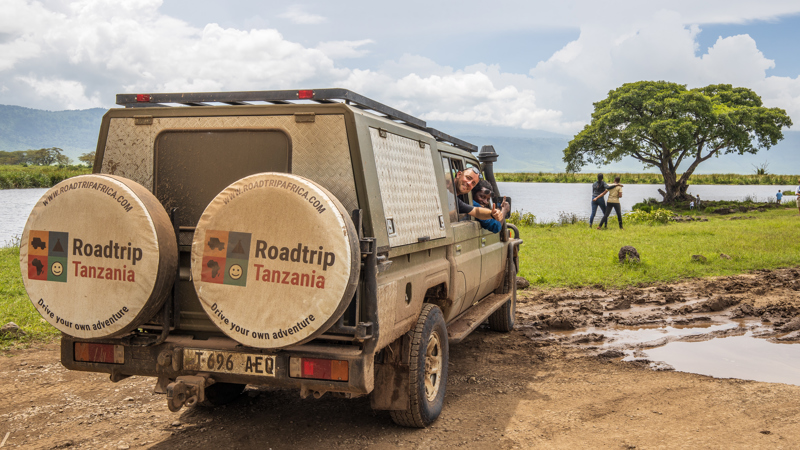Driving in Tanzania: tips & information
Thinking about roadtripping Tanzania? Driving in Tanzania is an incredible adventure and absolutely doable with the right preparation - even for first-timers!
This guide gives you clear tips and practical advice. Learn about renting a reliable 4x4, staying safe on the road, and what to expect while driving. You’ll also find answers to common questions, like road conditions and what gear you need.
Not keen to drive yourself? No worries! We explain how to hire a friendly, knowledgeable driver-guide to handle the roads for you.
Ready to start your adventure? Rent a safe, reliable 4x4 with us today and hit the road with confidence!
How are the road conditions for driving in Tanzania?
Driving in Tanzania offers smooth highways and rugged dirt roads. Here’s what you need to know to plan your route safely and avoid surprises.
Northern Tanzania
By African standards, the roads in northern Tanzania are excellent. The main highways connecting Arusha, Ngorongoro, Moshi, Kilimanjaro, Lushoto, and Dar es Salaam are well-paved, but expect many speed bumps and occasional potholes.
Although the asphalt roads are in good condition, travel speeds are generally low. Between speed bumps, village crossings, and photo stops for the stunning scenery, you’ll rarely drive faster than 50 km/h. Avoid the mistake of packing too much into one trip - Google Maps travel times are misleading. Instead, check our driving times and distances table for realistic planning.
Secondary roads
Tanzania’s C and D roads are mostly dirt roads with potholes and eroded surfaces. Expect the final stretch of your daily trips to include some off-road driving.
Inside the national parks
Inside the parks, you'll drive off-road on dirt roads most of the time. The conditions of these roads tend to vary from one season to the next and are most challenging during the rainy season. Off-road driving in the northern safari circuit is usually straightforward, except for:
- Serengeti’s main roads – The Naabi Hill Gate to Seronera route, and roads leading east and west, are rocky and badly corrugated. Drive slowly (<25 km/h) to protect your vehicle.
- Serengeti to Lake Natron – The new tarmac road from Klein’s Gate to Wasso is smooth, but after Sonja, the final 20 km to Engaresero is rough and eroded, and requires careful driving.
Southern Tanzania
Reaching the southern safari parks involves long gravel sections:
- Kibiti to Nyerere National Park (formerly Selous) – 90 km
- Morogoro to Selous (Matembwe Gate) – 90 km
- Iringa to Ruaha – 110 km
- Dodoma to Babati - approx. 2.5 hours
In Nyerere National Park, roads become very challenging in the rainy season. A Land Cruiser is therefore essential.
Roads to avoid & safety tips
Avoid shortcuts on secondary roads in Tanzania - they are often in bad shape. If you're unsure about your route during your self-drive, don't experiment. Contact the 24/7 Roadtrip Africa team in Arusha via WhatsApp for advice on the safest and best routes. We are here to help you travel smoothly and safely!
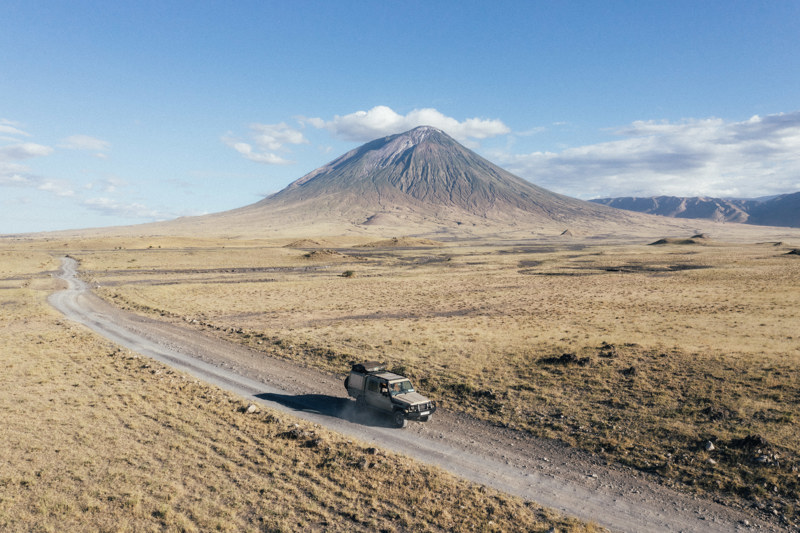
Do I need an international driving license in Tanzania?
No, you don't need an international driver's license in Tanzania. Your valid license from your home country is sufficient. Make sure to always carry your driver's license with you when driving.
At what side of the road should I drive in Tanzania?
Left. Driving in Tanzania is done on the left side of the road.
Is it safe to drive in Tanzania?
Driving in Tanzania is an unforgettable experience! With the right preparation and caution, you can enjoy a smooth and safe road trip. Follow these essential tips to stay safe on the road:
- Drive defensively: take it slow and avoid long driving days. Fatigue leads to accidents, and covering too much ground in one trip isn’t worth the risk.
- Watch out for washboard roads: speeding on corrugated dirt roads makes steering difficult and dangerous. Drive slowly to stay in control.
- Look out for speed bumps and potholes: unmarked speed bumps are common at town entrances. Potholes can cause serious vehicle damage or flat tyres, so stay alert.
- Stay connected: buy a local SIM card with internet access to use Google Maps and reach out to our team via WhatsApp if needed.
- Park securely: if you're staying in a local town, always choose accommodations with a secure parking area. Never leave valuables unattended.
- Avoid night driving: potholes are hard to see, and oncoming traffic often uses blinding high beams. Plan to finish your drives before sunset.
- Be prepared: carry cash, water, and a fully charged mobile phone in case of emergencies.
By following these tips, you’ll have a safe and enjoyable self-drive adventure in Tanzania.
Prefer a local driver?
If you’d rather sit back and soak in the scenery, then book a car with a knowledgeable driver-guide. They’ll handle the roads while you relax and enjoy Tanzania’s beauty stress-free!
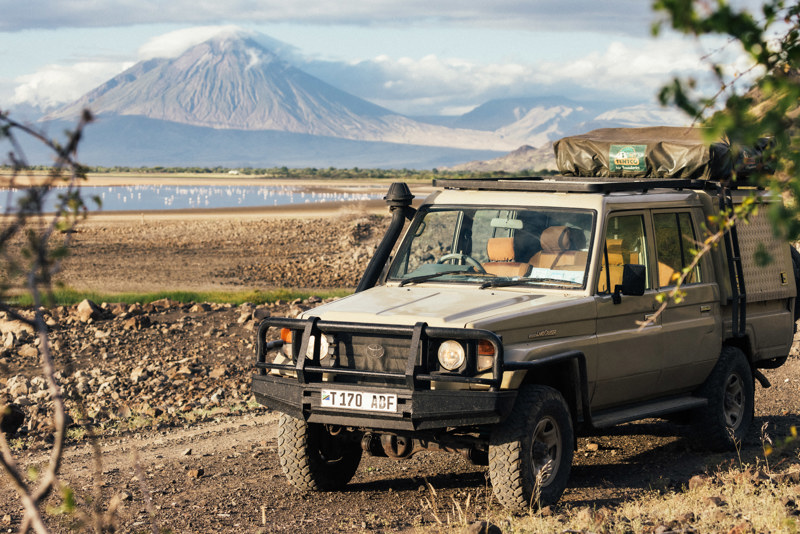
What are the speed limits in Tanzania?
- 80 km/hour on highways. In Tanzania, Land Cruisers are classified as trucks due to their longer braking distance. As a result, they are not allowed to exceed 80 km/h on highways.
- 40 km/hour when driving through towns. Note that the main highways also pass through towns, so make sure to reduce your speed.
- 35 km/hour inside the National Parks. Depending on the various tracks.
Our cars are equipped with trackers and for your own safety, we receive instant notifications when our vehicles exceed the speed limit.
Can I cross borders with my rental car?
Combining Tanzania with Kenya
If you want to visit both countries, you’ll need two separate vehicles; one from our Nairobi branch and one from our Tanzania branch in Arusha. Tanzania-registered cars are currently banned from entering the Masai Mara due to a trade dispute. Rules can change unexpectedly and are often left to the discretion of park rangers. Therefore, we advise against taking Tanzanian-registered vehicles into Kenyan parks, conservancies, and reserves.
If you want to combine the two countries, you have two options:
- Shuttle bus + 4x4 rental (most affordable)
Explore Tanzania with a 4x4 from our Tanzania fleet. Then take a daily shuttle bus (such as Riverside or Impala Shuttle) from Arusha to Nairobi, crossing the Namanga border on the way (about 5–6 hours). Once in Nairobi, pick up your 4x4 from our Kenya fleet and continue your safari.
- Vehicle swap at the border (most convenient)
Drive your Tanzania 4x4 to the Namanga or Oloitokitok border. Swap vehicles with our Kenya team right at the border. Extra costs apply, as we need to return both cars to Nairobi and Arusha afterwards.
For tips on how to combine the Masai Mara (Kenya) with the Serengeti (Tanzania) in one trip, check out our Travel Blog!
Combining Tanzania with Uganda
If you want to combine the two countries, you have two options:
- Border crossing
Border crossing to Uganda is possible. We arrange the car paperwork and COMESA insurance.
It's also possible to start your rental in Arusha and drop off your vehicle at another location in Tanzania or Uganda, but one-way charges apply. You can select these options in our booking form.
Take note that entering the national parks in Uganda with a Tanzania-registered vehicle will result in higher fees. Locally registered cars are charged approximately US$10, while foreign vehicles are charged around US$150.
- Vehicle swap at the border.
Explore Tanzania with a Tanzanian vehicle and Uganda with our Ugandan-registered vehicle. Fly between the countries, or swap vehicles with our Uganda team right at the border. Extra costs apply, as we need to return both cars to Nairobi and Kampala afterwards.
East Africa road trip
If you want to go on an East Africa road trip, rent a 4x4 from our Uganda branch in Kampala for the entire trip. You can also start your rental in Kampala and drop off your vehicle at another location or country (Kenya, Tanzania, Rwanda), but one-way charges apply.
Get in touch for more details about the aforementioned possibilities.
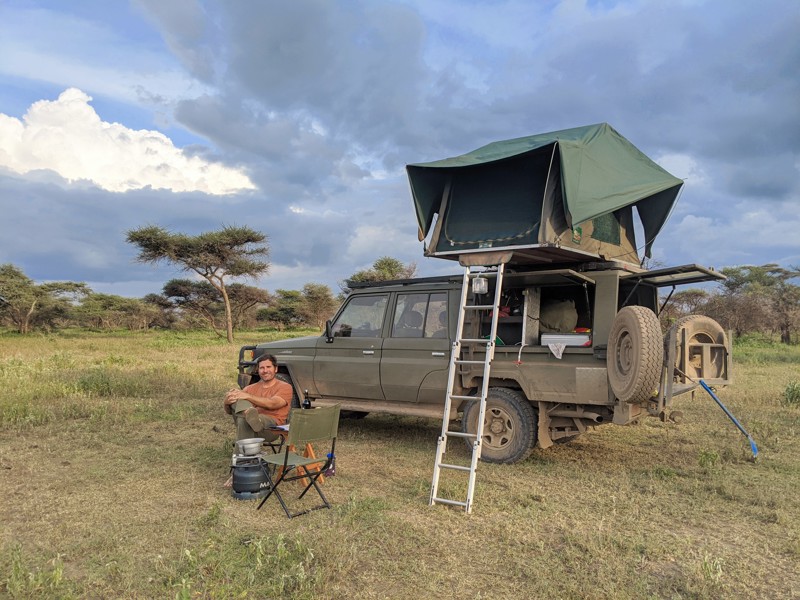
Is insurance included with my car rental in Tanzania?
Yes, our car rental in Tanzania includes insurance. This covers damage from accidents or fire and includes third-party liability in case of a car accident.
Choose your insurance coverage
Our standard insurance has a maximum deductible of €1500. This means that in the event of damage for which liability is waived, the first €1500 is at your own expense (also called the excess fee).
When you add Comprehensive Collision Damage Waiver (€10/ day), the maximum deductible is lowered to € 250.
When you choose Zero Excess (€20/ day), the insurance also covers damage to tyres, screens and undercarriage, and the excess fee is lowered to zero.
What’s not covered?
Our full terms & conditions are included in the car rental agreement. You can also consult them here.
Which Telecom providor to use in Tanzania?
Tanzania has several mobile network providers, but Airtel usually works best for northern routes. Vodacom and Tiggo are preferred for the coastal region.
Before you start your roadtrip, make sure you get a SIM card and load it with sufficient data for internet and phone calls. You can easily obtain a SIM card by bringing your passport to the Telecom company's service centre of your choice.
If you’ve rented your car with us, our team is happy to assist you. Whether we’re meeting you at the airport or your lodge, we’ll explain where and how to buy a SIM card to keep you connected on your journey.
How does it work with navigation in Tanzania?
All our rental vehicles in Tanzania come with a detailed roadmap of Tanzania to help you plan your route.
Besides Google Maps, we strongly recommend that you also install Maps.me on your smartphone before you travel to Tanzania. It's a free app that allows you to use GPS offline. We also recommend downloading the app iOverlander, which includes almost every campsite in the country.
When using navigation apps like Google Maps or Maps.me, increase the suggested travel time by roughly 30%. Tanzania's road conditions and traffic can slow you down. For more details, check out our driving times & distances table.
What happens if I get a breakdown or accident while driving in Tanzania?
Our fleet of second-hand cars is well-maintained and carefully checked before every trip. However, driving on Tanzania's rugged roads can sometimes lead to unexpected issues. Here’s what you need to know:
Why breakdowns happen
Breakdowns can occur due to:
- The condition of the car
- Road conditions (potholes, speed bumps, mud, dust)
- Driving behaviour (speeding, fatigue)
- Bad luck
Although we can only affect the first of these events, we will help you to the best of our abilities, regardless of the reason for your breakdown. Our team is very experienced in troubleshooting along the way but keep in mind that cooperation, flexibility, and patience from your end are key to resolving issues quickly too.
Preventing issues
In our ten years of experience, we learned that many breakdowns on self-drive trips are caused by driving behaviour - often infused by jam-packed itineraries leading to long driving days and speeding or fatigue. Hence, our most important piece of advice: make sure your travel plan is not too ambitious. Prevention is better than troubleshooting.
What we do to help
-
Minor issues: We’ll connect you with our network of bush mechanics for quick, on-the-spot fixes.
-
Major issues: If the car cannot be repaired within 24 hours, we’ll provide a replacement vehicle so you can continue your trip.
-
Accidents or breakdowns: Contact our Tanzania office immediately. We’re available 24/7 to guide and assist you.
Is a self-drive trip right for you?
Ask yourself: can I stay calm in unexpected situations like a flat tyre, mud, or delays? If not, a self-drive trip might not be the best choice. Tanzania's roads can be unpredictable, and flexibility is essential.
For more information, please refer to our Terms & Conditions published on this website.
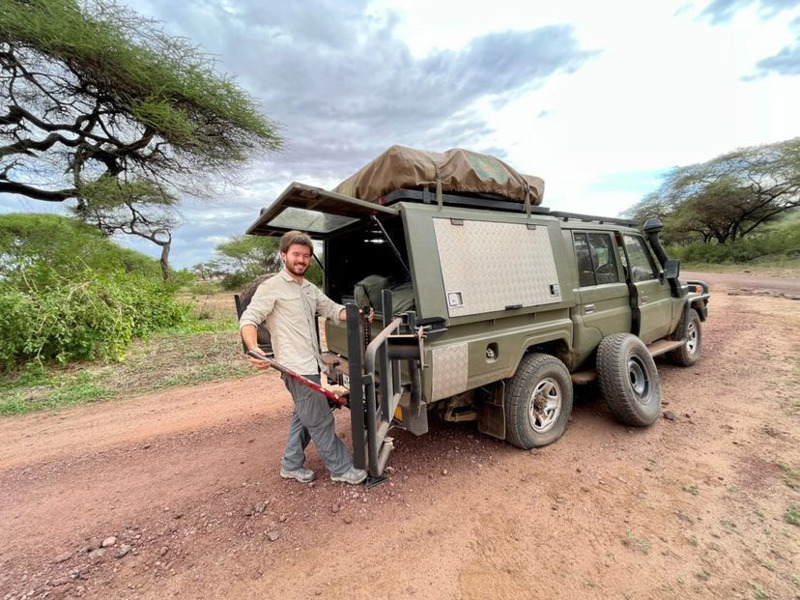
Where can I rent a driver in Tanzania?
If you prefer not to drive yourself, hiring a local driver-guide is a fantastic option. At Roadtrip Africa, we can arrange a knowledgeable and friendly driver to accompany you on your road trip.
Why hire a driver-guide?
-
Local expertise: Your driver knows Tanzania's roads, culture, and hidden gems, making your trip stress-free and enriching.
-
Flexible itinerary: You stay in control of your holiday plans while your driver handles the logistics and driving.
Hiring a driver is simple - just let us know during your booking, and we’ll take care of the rest!
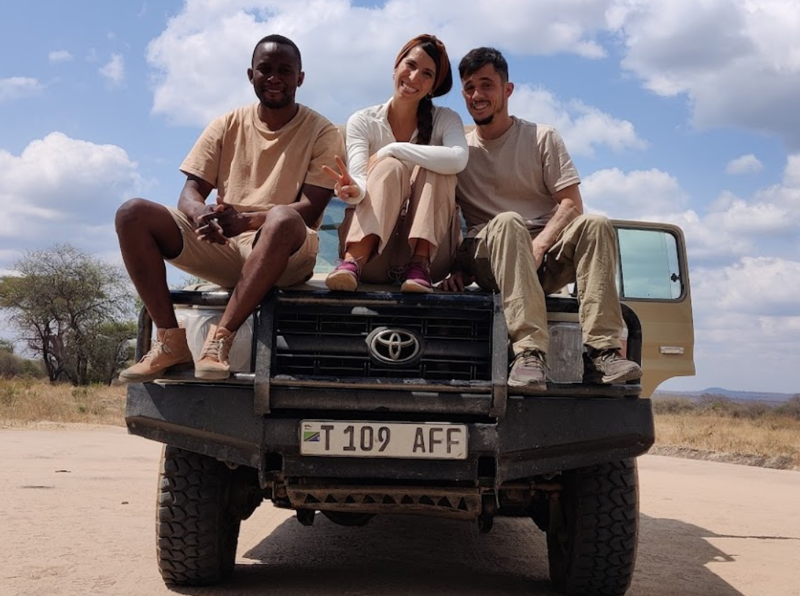
How do I deal with traffic police in Tanzania?
There are a lot of traffic police in Tanzania, and you’ll spot them easily by their bright white uniforms. We often wonder how they manage to keep them so spotless on the dusty roads - but that’s a mystery for another day!
When dealing with any government official in Tanzania, the best approach is to stay respectful, patient, and friendly. A warm greeting in Swahili (“Jambo!”), a smile, or even a lighthearted joke can go a long way in turning a routine stop into a positive encounter.
Traffic police may pull you over to check:
- Whether your car is insured.
- If your tyres are in good condition.
- Your driver’s license. Any valid license from your home country is accepted in Tanzania.
If you commit a traffic offence, such as speeding or dangerous overtaking, you’ll receive a fine that must be paid via bank deposit. If you’re unsure what to do, don’t hesitate to call our Roadtrip Africa team in Arusha - we’re here to help!
Where can I rent a car in Tanzania?
Excited to start your road trip in Tanzania? At Roadtrip Africa, we’re here to help you find the perfect vehicle for your adventure.
Why choose Roadtrip Africa?
-
Reliable 4WD fleet: Our vehicles are sturdy, widely trusted, and ideal for Tanzania's roads.
-
No third parties: We own all our cars, ensuring top quality, 24/7 roadside assistance and no fuss.
-
Years of experience: We are adventure travellers ourselves, and have a knowledgeable, local team on the ground to guide you.
Ready to go?
Book your 4WD car today and get ready to explore Tanzania at your own pace!
